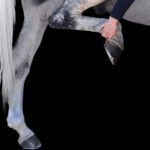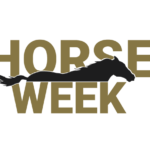September 20, 2002 — A great four-in-hand driver has to have a bit of the artist in his soul. That thought occurred to me as I watched Tucker Johnson in the marathon, while he was in an obstacle known as “The Bull Ring.” Because, of course, it was a model of a bull ring, with matadors’ capes decking the walls.
The neat turns Tucker was making with his statuesque bay horses reminded me of the flicks and spins performed by a matador. One particularly memorable rollback brought an appreciative roar from the crowd. Okay, nobody said “Ole!” but that would have been the perfect punctuation point for Tucker’s tour of that hazard.
I found it a lot easier to keep up with the drivers on the marathon than I did with the riders on the cross-country last week here at Garrapilos. So I followed Tucker and saw what can happen even to one of the best when teamed with an impressive amount of horsepower in tight quarters.
USET driver Tucker Johnson in “The Bull Ring” during the marathon phase. ? Charles Mann
Despite the intelligence from the eventers, who competed up here at Garrapilos last weekend, Tucker said, “I didn’t perceive how slippery the hazards would be.” He found out immediately, in the first obstacle, “The Vineyard.” I drew in my breath sharply as I saw one of his horses slide and start to go down. But everything righted itself and he continued.
At the sixth, a tiered production called “The Balcony,” he nearly came to grief. But let him tell you about what happened after he went into the C element at a sharp angle.
“My left wheeler didn’t see the post. Fortunately, it didn’t hit him, but the carriage hit the post really hard and it popped us up. The strap that they used to pull me into the carriage put a lot of pressure on my ribcage and that doesn’t feel very good. Then I fell back out over the right side of the carriage and fell on my left wrist and lost my left rein.” He also dented the Rolex that his wife, Charlotte, had given him as a present. Ouch all the way around.
“It’s not a safe sport,” observed Tucker’s teammate, Chester Weber. And that was BEFORE Tucker went on course.
It all shows once again that things rarely go the way you plan them when it comes to horses.
“It was not the marathon I was dreaming of having at this world championships,” Tucker agreed.
He and Chester, who were tied for third at the end of dressage, dropped to fourth and fifth respectively. The U.S. also went down a placing, from first to second, behind the Dutch, who have a hefty 11.51-penalty margin over the U.S. The Germans are third, less than one 5-point penalty for dropping a ball in tomorrow’s cones segment, with just 4.02 penalties more than America.
This country has never won a medal in four-in-hand driving, and with a team like Tucker, Chester and Jimmy Fairclough, a veteran of 22 years of world championships, this is our opportunity.
Tucker thinks the cones will be rough, and offer a chance to shake up the standings. There’s plenty of incentive for all three to drive clean — and all three are capable of doing it — but they’re up against some stiff challengers. Standing first individually is a former world champion, Ijsbrand Chardon of the Netherlands, while reigning world champ Tomas Eriksson of Sweden is third after winning the marathon with a score more than 11 penalties better than Tucker’s. Second is Christoph Sandmann of Germany.
“We’re going to fight like hell to keep our team score,” said Chester.
Jimmy, who went through a gate backwards due to a mental lapse and got 20 penalties, is eager to do well in cones after having the drop score in the first two phases. So everyone’s motivated.
And it seems everyone has been enjoying these championships.
“The Spanish hospitality has been fantastic,” said Chester. “There are a couple of attentions to detail that I wish had been addressed. But everything else has been very professional.”
The obstacles designed by Arjan Brink were beautiful, with tricky approaches and exits. Tucker said slyly that Arjan may have been inspired by the guy who designed the approach to the dressage ring, which none of our drivers liked (That was what Chester referred to when he mentioned the attention to detail.)
USET driver Tucker Johnson negotiates a water hazard during the marathon phase of the driving competition at the 2002 World Equestrian Games. ? Nancy Jaffer
Arjan also worked with Mike Tucker, the eventing cross-country course designer, to utilize some of the cross-country obstacles, most notably the two waters. They really filled the second water deep. I got droplets on me as the horses splashed through, a very impressive sight. “Real sea horses,” was the thought that came to my mind as the spray flew during their aquatic gallops.
While watching one portion of the marathon, I spoke to USET Show Jumping Coach Frank Chapot about his take on why we didn’t get a show jumping medal yesterday. (By the way, I saw the female members of the show jumping team here rooting on the drivers; good team spirit.)
Frank, who never pulls any punches, said, “The riders rode well, but the horses didn’t perform as well as they should. We were a little bit out-horsed, I think.”
The exception, of course, was Fein Cera, Peter Wylde’s mount, and Frank concedes he was “a little bit surprised” to see Peter at number one in the individual standings. Frank thinks Peter will come through tomorrow’s top 25 ride-off fine, and predicts that Peter, the Erics, as I call them (Navet and Lavellois of France) and Olympic gold medalst Jeroen Dubbeldam of Holland, will be in the Final Four on Sunday.
I wondered what Frank thought about our selection process this year, and he felt it was pretty good, though perhaps next time a Table C test, one round against the clock, should be included in the trials package of classes, since that is the way the competition here began.
Should we have had different people on our team, I asked (though the only person I could think of who had a sound horse and maybe should have been here but wasn’t was Chris Kappler.)
“There’s nothing better to replace these people with,” said Frank. He agreed Chris was impressive in winning the trials’ final two rounds with the only double clear, and now he’s just won the American Gold Cup. But he believes the selectors were not that familiar with Chris and his horse, Royal Kaliber, to put him on the team subjectively. He also noted the fact that Chris had missed two trial segments because of a high nail. The rest left the stallion fresh and gave him an advantage in the finals.
Well, folks, we’re getting close to the end here. Hard to believe I’ve been getting by with four hours sleep a night for nearly two weeks, and survived both the flu AND the odd Spanish food (I never know WHAT I’m eating) when I could get it. Most nights, it was just cheese, but I finally got some crackers yesterday at the giant Spanish supermarket. (I recognized hardly anything on the shelves.)
One of the women in the press was telling the tale of how a few years ago, her parents went to China, had some stomach-turning experiences with the food and decided just not to eat. When they got home, their daughters came rushing to meet them but they got only a brief hello, as the parents stampeded for the phone to order out pizza.
I empathize. I’ll be heading to my favorite supermarket for some nice sliced turkey and salad fixings. I’ve had enough of the strange peas-and-scallions combo for breakfast, the mystery meat and fish, and the gloppy dessert that twinned creme brulee with mystery fruit. But it was worth missing a few good dinners to see the kind of competition we’ve had here. Buenas noches.





